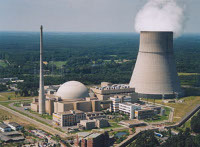Russia and Belarus to build nuclear power plant
 Belarus President Alexander Lukashenko has approved the draft intergovernmental agreement with the Russian Federation on cooperation in construction of a nuclear power plant in Belarus. Minsk asked for a governmental loan for the construction at the amount of $9 billion. The Belarusian side will be creating a joint venture for sales of the electricity to the EU countries.
Belarus President Alexander Lukashenko has approved the draft intergovernmental agreement with the Russian Federation on cooperation in construction of a nuclear power plant in Belarus. Minsk asked for a governmental loan for the construction at the amount of $9 billion. The Belarusian side will be creating a joint venture for sales of the electricity to the EU countries.

The plant with a capacity of 2.4 GW will be commissioned in 2018. As stated previously by head of Rosatom Sergei Kiriyenko, the first power unit can be completed by the end of 2016. Electricity from one unit of the nuclear power plant will be supplied to the domestic market of Belarus, and the energy produced by the second unit can be exported. The general contractor of the project is a Russian company Atomstroyexport.
Interfax news agency received the information that the draft document has been approved "taking into account fundamental changes made as a result of negotiations with the Russian side".
Belarus has officially asked Russia for a loan of $9 billion for the construction of this nuclear power plant, including the cost of building infrastructure. The worth of the plant itself is estimated by Belarusians at $6 billion. In January, the head of Rosatom Sergei Kiriyenko said that the project will cost $6 - $7 billion. General contract for construction of the nuclear power plant is to be signed in May, and a loan agreement between the countries on nuclear power - in June.
An intergovernmental agreement to ensure the parallel operation of energy systems of the two countries was signed at the meeting of the Council of Ministers of Belarus on Tuesday.
A joint venture that will be created by July 1 on a parity basis in Belarus by Inter RAO UES and Belenergo will be engaged in marketing and creating its own power grid infrastructure. The joint venture will have the exclusive right to sell the energy for export.
"The joint venture will have the right to sell Russian or Belarusian energy if it is economically beneficial for us, but only through an intergovernmental network structure created by it. That is, not through existing networks, but through its own network," RBC quoted Deputy Energy Minister of Belarus.
At the same time several countries reported on the suspension of generation and additional inspections at nuclear power plants after the natural disasters and technological accidents at the nuclear power plants in Japan, Fukushima-1 and Fukushima-2.
Germany will temporarily shut down 7 of its 17 nuclear power plants, as announced by Chancellor Angela Merkel. These are the plants that have been commissioned before 1980, and their operations were suspended for three months. Environment Minister of Switzerland Doris Leuthard has stopped the process of upgrading the three reactors and the construction of new nuclear power plants in the country. The Austrian government has launched a political campaign for the closure of nuclear power stations across Europe.
A group of scientists and environmentalists turned to Alexander Lukashenko calling him to cancel the construction in Belarus. NGO representatives reminded him that at the end of the last century, an earthquake with a magnitude of up to 7 points affected Astravets in Grodno, where he is planning to erect the station.
However, Russian Prime Minister Vladimir Putin said that Belarus project is the last generation and the level of protection. Russia and Belarus do not intend to participate in the acute struggle against the peaceful atom. Soon two new nuclear power stations that are being built with a consideration of the supply of electricity for export to third countries may appear on the eastern borders of the European Union.
In 2010, Prime Minister Vladimir Putin signed a decree according to which the Baltic nuclear plant will be built on the territory of Neman district of Kaliningrad Region.
In late December of 2009, fulfilling the requirements of the European Union, Lithuania has stopped the operation of Ignalina NPP. The Russian side explains the construction of a new nuclear power plant in the Kaliningrad region by the need to offset the energy deficit in the enclave.
In addition, the Baltic nuclear power plant that is being built 20 kilometers from the border with Lithuania is designed for electricity exports to EU countries. "We are now ready to discuss contracts for 20 years to supply electricity, as well as determine the formula for the prices for electricity," head of state corporation Rosatom Sergei Kiriyenko told reporters, adding that he was talking about long-term, up to 20 years, contracts.
The Baltic NPP project involves the construction of two units with a capacity of 1150 MW each. The first unit is scheduled to be commissioned in 2016.
Vitaly Salnik
Bigness
Read the original in Russian
Subscribe to Pravda.Ru Telegram channel, Facebook, RSS!

